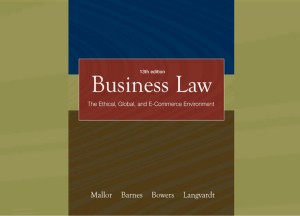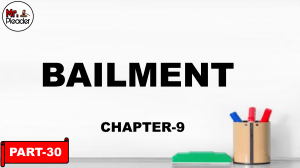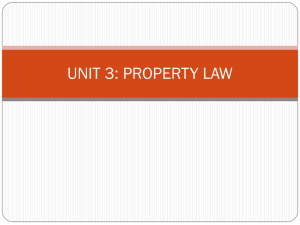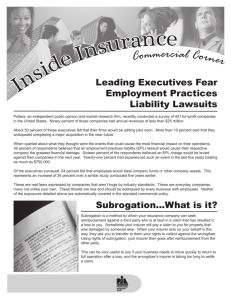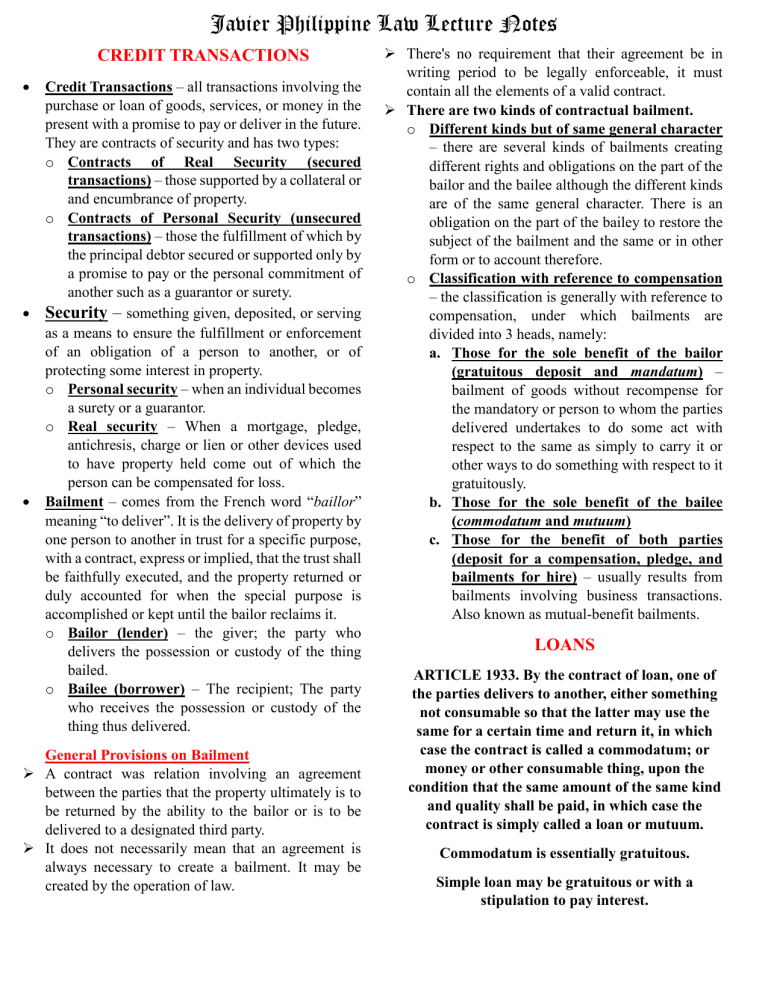
Javier Philippine Law Lecture Notes CREDIT TRANSACTIONS Credit Transactions – all transactions involving the purchase or loan of goods, services, or money in the present with a promise to pay or deliver in the future. They are contracts of security and has two types: o Contracts of Real Security (secured transactions) – those supported by a collateral or and encumbrance of property. o Contracts of Personal Security (unsecured transactions) – those the fulfillment of which by the principal debtor secured or supported only by a promise to pay or the personal commitment of another such as a guarantor or surety. Security – something given, deposited, or serving as a means to ensure the fulfillment or enforcement of an obligation of a person to another, or of protecting some interest in property. o Personal security – when an individual becomes a surety or a guarantor. o Real security – When a mortgage, pledge, antichresis, charge or lien or other devices used to have property held come out of which the person can be compensated for loss. Bailment – comes from the French word “baillor” meaning “to deliver”. It is the delivery of property by one person to another in trust for a specific purpose, with a contract, express or implied, that the trust shall be faithfully executed, and the property returned or duly accounted for when the special purpose is accomplished or kept until the bailor reclaims it. o Bailor (lender) – the giver; the party who delivers the possession or custody of the thing bailed. o Bailee (borrower) – The recipient; The party who receives the possession or custody of the thing thus delivered. General Provisions on Bailment A contract was relation involving an agreement between the parties that the property ultimately is to be returned by the ability to the bailor or is to be delivered to a designated third party. It does not necessarily mean that an agreement is always necessary to create a bailment. It may be created by the operation of law. There's no requirement that their agreement be in writing period to be legally enforceable, it must contain all the elements of a valid contract. There are two kinds of contractual bailment. o Different kinds but of same general character – there are several kinds of bailments creating different rights and obligations on the part of the bailor and the bailee although the different kinds are of the same general character. There is an obligation on the part of the bailey to restore the subject of the bailment and the same or in other form or to account therefore. o Classification with reference to compensation – the classification is generally with reference to compensation, under which bailments are divided into 3 heads, namely: a. Those for the sole benefit of the bailor (gratuitous deposit and mandatum) – bailment of goods without recompense for the mandatory or person to whom the parties delivered undertakes to do some act with respect to the same as simply to carry it or other ways to do something with respect to it gratuitously. b. Those for the sole benefit of the bailee (commodatum and mutuum) c. Those for the benefit of both parties (deposit for a compensation, pledge, and bailments for hire) – usually results from bailments involving business transactions. Also known as mutual-benefit bailments. LOANS ARTICLE 1933. By the contract of loan, one of the parties delivers to another, either something not consumable so that the latter may use the same for a certain time and return it, in which case the contract is called a commodatum; or money or other consumable thing, upon the condition that the same amount of the same kind and quality shall be paid, in which case the contract is simply called a loan or mutuum. Commodatum is essentially gratuitous. Simple loan may be gratuitous or with a stipulation to pay interest. Javier Philippine Law Lecture Notes In commodatum the bailor retains the ownership of the thing loaned, while in simple loan, ownership passes to the borrower. (1740a) A contract of loan is: - Real contract because the delivery of the thing is necessary for the perfection of the contract. - Unilateral contract because once the subject matter has been delivered, it creates obligations on the part of only one of the parties. Commodatum Commodatum – a gratuitous contract where the bailor delivers to the bailee an non-consumable thing so that the latter may use it for a certain time and return the identical thing. - If payment is involved it may be a different contract (e.g., Lease)(1935). - If use is not the principal cause of the contract for the borrower, it may be a different contract (e.g., Deposit). - If the purpose of the contract for the borrower is the fruits, it may be a different contract (e.g., Usufructs). - Both movable/personal or immovable/real properties may be the object of a commodatum (1936), as long as it is non-consumable. Consumable may be an object of a commodatum as long as they are used for exhibitions or display only (1937). - It is a purely personal contract because: Bailee cannot lend the thing to third persons. The bailor must have a possessory interest or the right to use the thing because the thing may be owned by a third person (1938). Death of either parties will extinguish the contract (1939). - Generally, bailee acquires temporary use of the object, but not of the fruits because ownership is not transferred, unless it is stipulated (1940). Obligations of the Bailee Obligations of the Bailee are the following: 1. Take care of the thing with ordinary diligence (the diligence of a good father of a family). 2. Return the exact identical thing borrowed. 3. Pay for the ordinary expenses for use and preservation of the thing borrowed (1941). Liability for loss of the Bailee (1942): 1. In case a thing is loss due to a fortuitous event, the bailee shall not be liable, unless he is guilty of delay or negligence. 2. If he devotes the thing to any purpose different from that agreed upon (e.g., A borrowed a car to B for a trip to Baguio, but A uses the car for a trip to Mindanao). 3. If he keeps it longer than the period stipulated or for the accomplishment of its use for which the commodatum has been constituted because in this case, the bailee is already in delay. 4. If the thing loaned has been delivered with appraisal of its value, unless there is a stipulation exempting the bailee from responsibility in case of a fortuitous event. 5. If he lends it to third persons not member of his household. 6. If, being able to save either the thing borrowed or his own thing, he chose to save the latter because such is an act of ingratitude (1746). In case the object of the commodatum deteriorates (1943): - General Rule: Bailee is not liable. - Exception: If there is an expressed stipulation to the contrary. If there is fault or negligence. If the bailee devotes the thing to any purpose different from that agreed upon. If he keeps it longer than the period stipulated or for the accomplishment of its use for which the commodatum has been constituted. In case of extraordinary expenses due to force majeure (unforeseeable circumstances that prevent someone from fulfilling a contract): - General Rule: Bailee shall shoulder half of the extraordinary expenses. - Exception: If there is an expressed stipulation to the contrary. The bailee shall have no right of retention in cases where the bailor owes something to the bailee. There shall only be a right of retention in case of hidden flaws or defects of the thing which causes damage to the bailee (1944). If there are two or more bailees under the same contract of commodatum, their liability shall be solidary (one of them can be liable for the whole Javier Philippine Law Lecture Notes obligation and if he satisfies the obligation, such shall be extinguished) (1945). Obligations of the Bailor Obligations of the Bailor are the following: 1. Respect the duration of the contract. - General Rule: Bailor cannot demand the return of the thing prior to the expiration of the period (1946, 1st par.). - Exception: If the Bailor has urgent need over the thing, he can either demand the return of the thing absolutely or just for temporary use. In case of temporary use, the contract of commodatum is suspended and shall continue after its return to the bailee. If absolute, the contract of commodatum shall be extinguished (1946, 2nd par.). Precarium – a contract of commodatum whereby the bailor may demand the thing loaned at will (1947). If the bailee commits any of the acts of ingratitude under the law on donations (1948): I. Crime – if donee should commit some offense against the person, owner or property of the donor, his wife, or children under his parental authority. II. Defamation – if donee imputes to the donor any criminal offense, or any acts involving moral turpitude, even though he should prove it, unless the crime has been committed against the donee himself, his wife, or children under his authority. III. Refusal to support – if donee unduly refuses him support when the donee is legally or morally bound to give support to the donor. The loan itself is for an illegal or immoral purpose. 2. Pay for the extraordinary expenses in case of preservation (1949, 1st par.). However, notice is generally required to be given him before the expenses were paid by the bailee, except when they are so urgent that the reply to the notification cannot be awaited without danger. 3. If the extraordinary expenses arise on the occasion of the actual use of the thing by the bailee, both parties shall equally bear the expenses (1949, 2nd par.). 4. He shall have the duty to disclose the hidden defects of the object to the bailee. If the bailee suffers the damage due to the hidden defects, the bailor shall be liable for damages (1951). In such case, the bailee shall have the right to retain the thing. 5. He cannot exempt himself from the payment of expenses or damages by abandoning the thing to the bailee (1952). Mutuum Mutuum – bailor delivers to the bailee money or other consumable thing upon the condition that the latter shall pay the same amount of the same kind and quality. - Contemplates both fungible and consumable things. - Ownership is transferred to the bailee and is also bound to pay to the creditor an equal amount of the same kind and quality (1953). - In terms of form: If the object of mutuum is money, it must be either in the currency stipulated by the parties or in legal tender. If the object of mutuum is other than money, it must be replaced by an object of the same kind, quality, or quantity. But if it is impossible, it shall be paid by the value at the time of perfection of the contract (1955). Fungible things – those who share usually dealt with by number, weight, or measure such as grain, oil, sugar, etcetera so that any given unit or person is treated as the equivalent of any other unit or portion. Consumable – consumed when used in a manner appropriate its purpose or nature, like rice, gasoline, money, fruit, firewood, etc. Interest Interest – it is the compensation allowed by the law, paid to the lender for the use of either money, goods, or credit. There are 3 requisites to receive monetary interest (1956): 1. It must be expressly stipulated. Javier Philippine Law Lecture Notes 2. The agreement on interest must be in writing. The parties may also stipulate that the obligation shall be subject to a certain rate of interest. If the rate is not written, the legal rate shall be imposed (6% per annum). If the interest was stipulated that such is payable in kind, the value shall be that which is appraised at the current price at the time and place of payment. 3. The interest must be lawful. Usury – the illegal action or practice of lending money at unreasonably high rates of interest. The usury law is suspended, allowing financial institutions to impose a higher rate of interest than the legal rate of interest. However, the supreme court held that the interest may be strucked down in case it is so unconscionable or shocking to the conscience that it makes the debtors slaves to financial institutions. If a person pays interest where interest is not due, the rules on solutio indebiti shall apply. In other words, the person who paid can recover it. REAL ESTATE MORTGAGE ARTICLE 2124. Only the following property may be the object of a contract of mortgage: (1) Immovables; (2) Alienable real rights in accordance with the laws, imposed upon immovables. Nevertheless, movables may be the object of a chattel mortgage. (1874a) Mortgage – a contract whereby the debtor secures to the creditor the fulfillment of a principal obligation, especially subjecting to such security, immovable property or real rights over immovable property in case the principal obligation is not complied with the time stipulated (2124). A contract of mortgage is: - Real contract because the delivery of the thing is necessary for the perfection of the contract. - Unilateral contract because it creates an obligation only on the part of the creditor who must free the property from the encumbrance once the obligation is fulfilled. - Accessory contract because its consideration is that of the principal contract from which it receives its life, and without which it cannot exist as an independent contract. - It is also a subsidiary contract. - It is not a transfer of ownership over the property, but merely a lien, encumbrance, or a burden placed upon a property. - It creates a real right which are enforceable against the whole world. Since the mortgagor or debtor is given the right to alienate the property or transfer it to a third person, which may subsequently transfer the object again to another third person, the REM attaches to the property with each transfer. The implication in turn is that the mortgagee may claim payment to whoever possesses the property (2126, 2128, 2129). - It extends to the property, accessions, improvements, fruits, income, and rents not yet received (2127). The requisites of an REM are the following: 1. Its purpose is to secure the fulfillment of a principal obligation. Past and present debts are covered, but future debts may be covered provided there is an agreement between the parties called “dragnet or blanket clause” which is specifically phrased to subsume all debts of past or future origins. 2. The mortgagor must be the absolute owner of the property. Any stipulation preventing the mortgagor from transferring his property to someone else is void (2130). The coverage of this requisite are the present properties that the mortgagor absolutely owns. Generally, future properties cannot be subjected to mortgage, except if there is an expressed stipulation to the contrary. 3. The mortgagor must have free disposal, or he must be legally authorized to dispose of the property. 4. The object must cover only immovable properties or real rights over the immovable property only. 5. The requirement of registration
